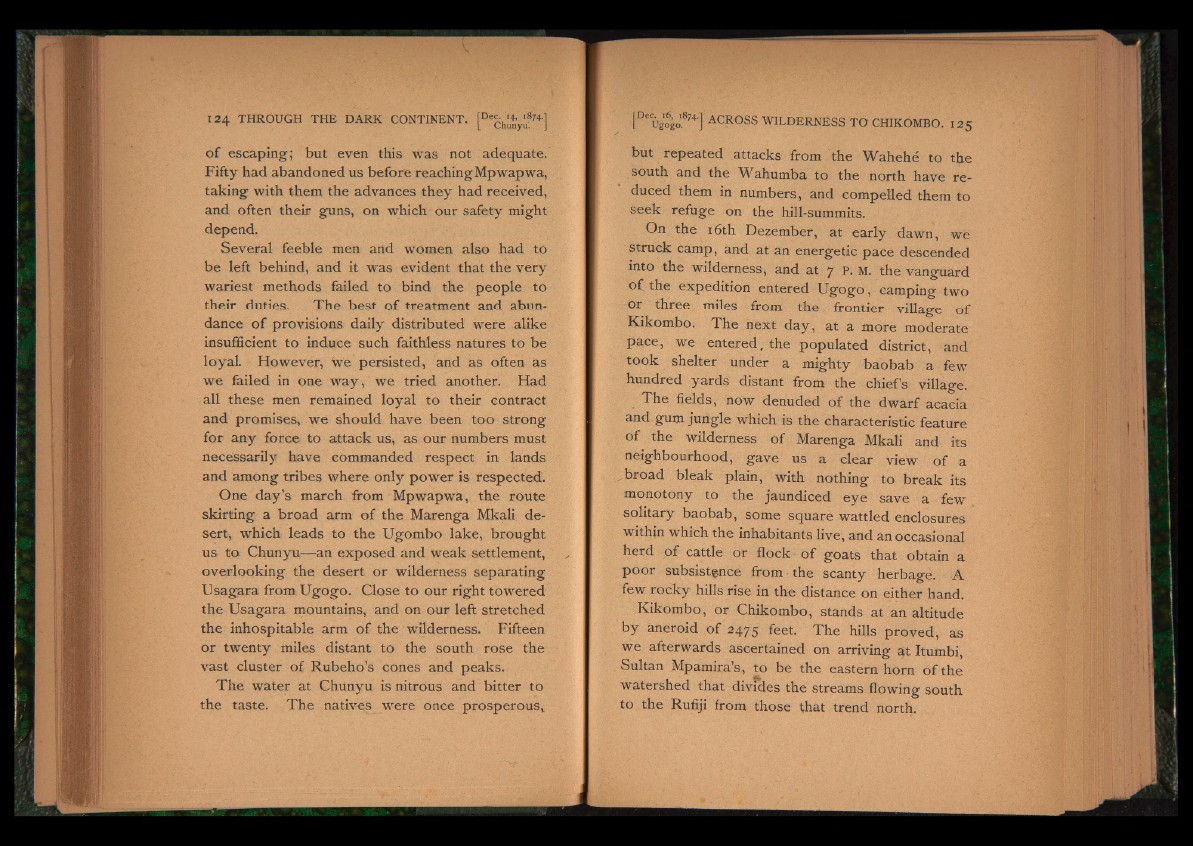
o f escaping; but even this was not adequate.
Fifty had abandoned us before reaching Mpwapwa,
taking with them the advances they had received,
and often their guns, on which our safety might
depend.
Several feeble men and women also had to
be left behind, and it was evident that the v e ry
wariest methods failed to bind the people to
their duties. The best o f treatment and abundance
o f provisions daily distributed were alike
insufficient to induce such faithless natures to be
loyal. However, we persisted, and as often as
we failed in one w a y , we tried another. Had
all these men remained lo y al to their contract
and promises, we should have been too strong
for any force to attack us, as our numbers must
necessarily have commanded respect in lands
and among tribes where only powe r is respected.
One d a y ’s march from Mpwapwa, the route
skirting a broad arm o f the Marenga Mkali desert,
which leads to the Ugombo lake, brought
us to Chunyu— an exposed and weak settlement,
overlooking the desert or wilderness separating
Usagara from U g o g o . Close to our right towered
the Usagara mountains, and on our left stretched
the inhospitable arm o f the wilderness. Fifteen
or twenty miles distant to the south rose the
vast cluster o f Rubeho’s cones and peaks.
T h e water at Chunyu is nitrous and bitter to
the taste. The natives were once prosperous*
but repeated attacks from the Wahehe to the
south and the Wahumba to the north have reduced
them in numbers, and compelled them to
seek refuge on the hill-summits.
On the 16th Dezember, at early dawn, we
struck camp, and at an energetic pace descended
into the wilderness, and at 7 p. m. the vanguard
o i the expedition entered U g o g o , camping two
or three miles from the frontier village o f
Kikombo. T he next day, at a more moderate
pace, we entered, the populated district, and
to o k shelter under a mighty baobab a few
hundred yards distant from the chief’s village.
T he fields, now denuded o f the dwarf acacia
and. gum jungle which is the characteristic feature
o f the wilderness o f Marenga Mkali and its
neighbourhood, ga ve us a clear view o f a
, broad bleak plain, with nothing to break its
monotony to the jaundiced e y e save a few
solitary baobab, some square wattled enclosures
within which the inhabitants live, and an occasional
herd o f cattle or flock- o f goats that obtain a
poor subsistence from the scanty herbage. A
few ro ck y hills rise in the distance on either hand.
Kikombo, or Chikombo, stands at an altitude
b y aneroid o f 2475 feet. The hills proved, as
we afterwards ascertained on arriving at Itumbi,
Sultan Mpamira’s, to be the eastern horn o f the
watershed that divides the streams flowing south
to the Rufiji from those that trend north.